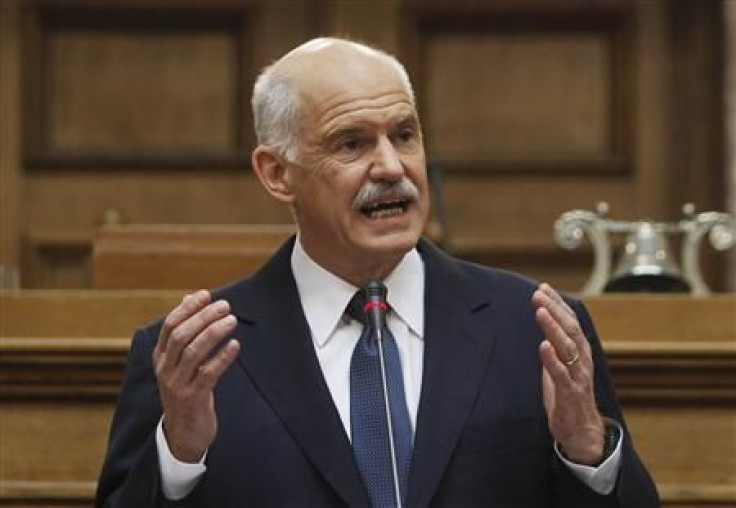Does Papandreou Fear a Military Coup in Greece?

Amidst a deepening political crisis in debt-scarred Greece, Prime Minister George Papandreou sparked even more outrage by replacing senior members of the Greek military with officials deemed to be more sympathetic to Papandreou.
In a shock announcement, Defense Minister Panos Beglitis -- a close ally of Papandreou -- said that the chiefs of the Greek army, navy and air force would be replaced by senior officers.
The sweeping changes come just two days before the government stages a confidence vote on Friday; and perhaps weeks before a referendum on the bailout rescue package that Greece received from leaders of the European Union (EU).
Specifically, General Ioannis Giagkos, chief of the Greek National Defense General Staff, will be replaced by Lieutenant General Michalis Kostarakos; Lieutenant General Fragkos Fragkoulis, chief of the Greek Army General Staff, will be replaced by Lieutenant General Konstantinos Zazias; Lieutenant General Vasilios Klokozas, chief of the Greek Air Force, will be replaced by Air Marshal Antonis Tsantirakis; and Vice-Admiral Dimitrios Elefsiniotis, chief of the Greek Navy General Staff, will be replaced by Rear-Admiral Kosmas Christidis
Neither Beglitis nor any other government official provided any explanation behind the sudden and unexpected moves. The ruling Socialist Pasok party currently has a slight majority in the Athens parliament.
The Daily Telegraph of Britain speculated that Papandreou or someone in his regime feared that a military coup was threatening to overthrow the government in response to the economic crisis. However, there have been no such rumors reported. Greece has been free of military rule since the 1967-1974 period.
Nonetheless, virtually all opposition parties, from far-right to far-left, have condemned the government’s decision to replace the military bosses.
The country’s principal opposition party, New Democracy, vowed in a statement: “Under no circumstances will these changes be accepted, at a time when the government is collapsing and has not even secured a vote of confidence. It has no moral or real authority any more, and such surprise moves can only worsen the crisis currently sweeping the country.”
New Democracy said that if it comes to power in the next general election --in the event the current regime loses Friday’s vote of confidence-- it wouldn't accept the new military assignments.
The left-wing Syriza party warned that the government’s decision “gives the impression that it wants to create a highly politicized armed forces that it can control at a time of political crisis.”
Syriza officials called on the President of the Republic, Karolos Papoulias, not to approve the defense ministers’ decree until a new election convenes.
Moreover, a columnist in the UK Guardian newspaper commented on Papandreou’s desperate plight: “By imposing ruthless austerity, privatization and liberalization, the EU has eventually succeeded in igniting the nationalist sentiment of Greeks. The rejection of the latest bailout has taken a nationalist tinge, often directed against perceived German domination. Papandreou is fully aware of the risk of being branded a traitor, fairly or unfairly. He is also aware of the advancing collapse of his government. But he is reluctant to hold fresh elections because he knows his party would be destroyed.”
© Copyright IBTimes 2024. All rights reserved.











